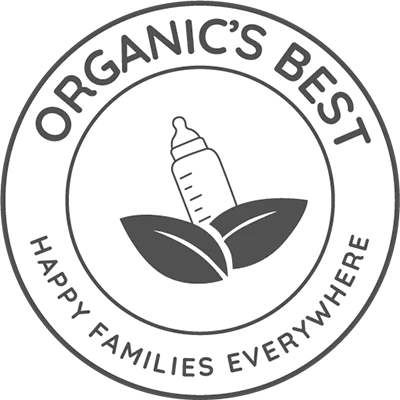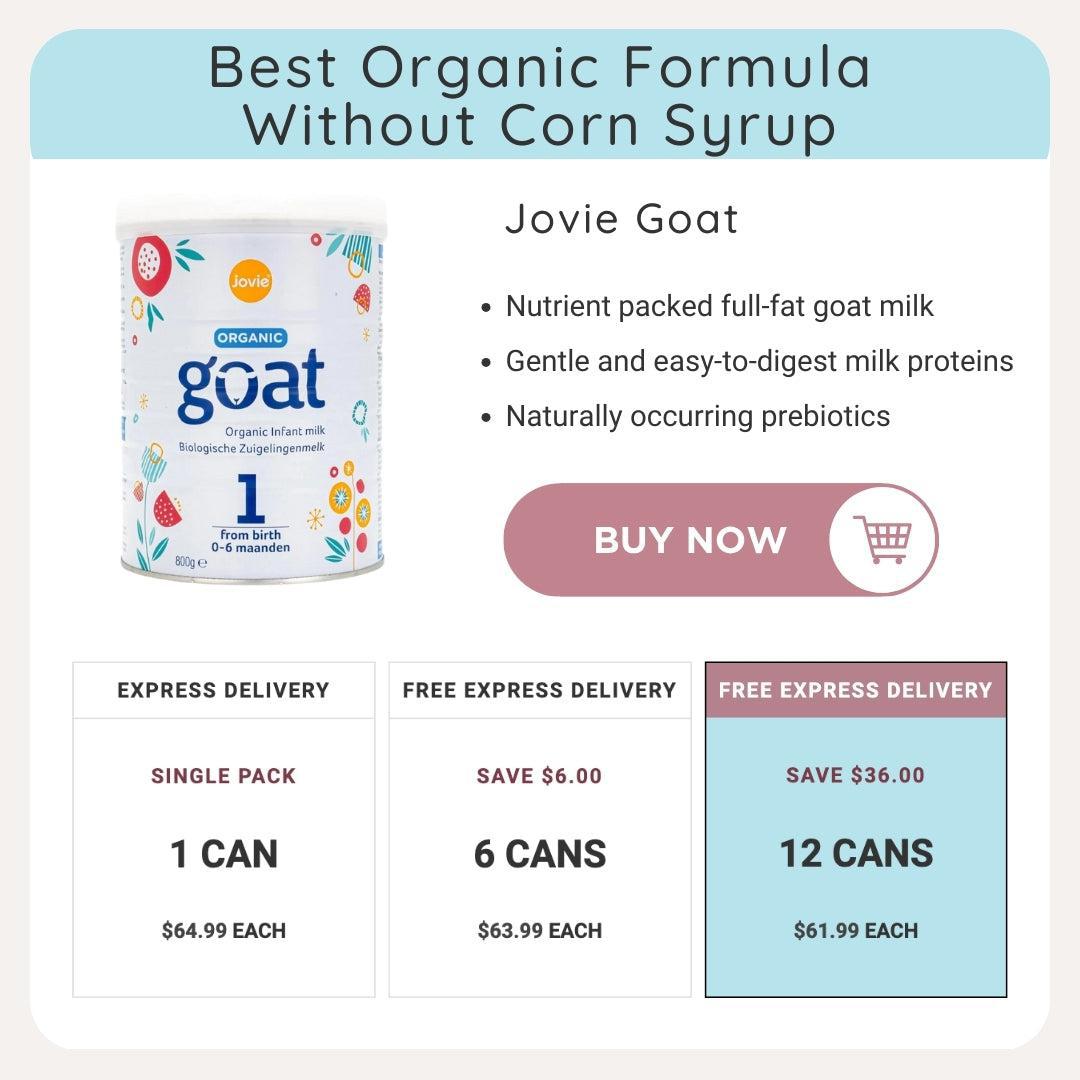Click to Get 2 FREE Boxes/Cans
Only New Customers! Order 12 Boxes of Formula or More to Get 2 Extra Boxes/Cans for Free With Your First Order
BABY FORMULA
Offering new parents top-quality European infant formula from renowned brands like HiPP, Holle, Kendamil, and more. If you’re uncertain about which product to choose, our Formula Finder can help you make the best decision for your baby.
Baby Food
Offering new parents a premium selection of European baby foods, including jars, pouches, cereals, and snacks from esteemed brands like HiPP and Holle.
Best Organic Baby Formula 2024
by Agustina Fernandez March 02, 2024 23 min read

Let's face it, more than ever, there's a heightened focus on the foods we consume, especially when it comes to our little ones. If you're just not satisfied with the run-of-the-mill baby formulas that you've come across, you're not alone. Parents are increasingly demanding higher-quality formulas, leading to a greater interest in organic options.
If you have been scouring the internet looking for ways to ensure your baby is getting high-quality, clean nutrition and need help choosing the best organic baby formula, you’ve come to the right place.
Our goal is to help you understand organic formula standards in both Europe and America, as well as provide a comprehensive list of our top-rated organic formulas. To guide you onto the next steps, we also have a quick rundown on how to select your baby's formula wisely.
Table of Contents
- What are organic baby formulas?
- European Organic Baby Formula vs Organic American Formula
- Is organic baby formula really better?
- Ranking The Best Organic Baby Formula From Germany
- Best Organic Formula Closest to Breast Milk - HiPP Dutch
- Best Organic Formula Without Corn Syrup - Jovie
- Best Natural Baby Formula from Goat’s Milk - Holle Goat Dutch
- Best Organic Formula for a Sensitive Stomach - Holle Cow German
- Best Value Organic Formula - Lebenswert Bio
- European Formula Comparison Chart
- What is the safest and healthiest formula? Factors to consider when buying formula
- Our Favourite Clean Baby Formula Brands
- Different Types of Formula
- European Organic Baby Formula Stages
- Scientific References
What are organic baby formulas?
Organic certification is a control body that governs how organic baby products are grown, processed, stored, shipped, and packaged. Formulas that fall under this certification are held to higher purity standards compared to conventional formula. If a product has been certified organic through either private organizations or government regulations, this will be clearly labelled on the packaging.
For a product to be considered EU organic, it must abide by these conditions...
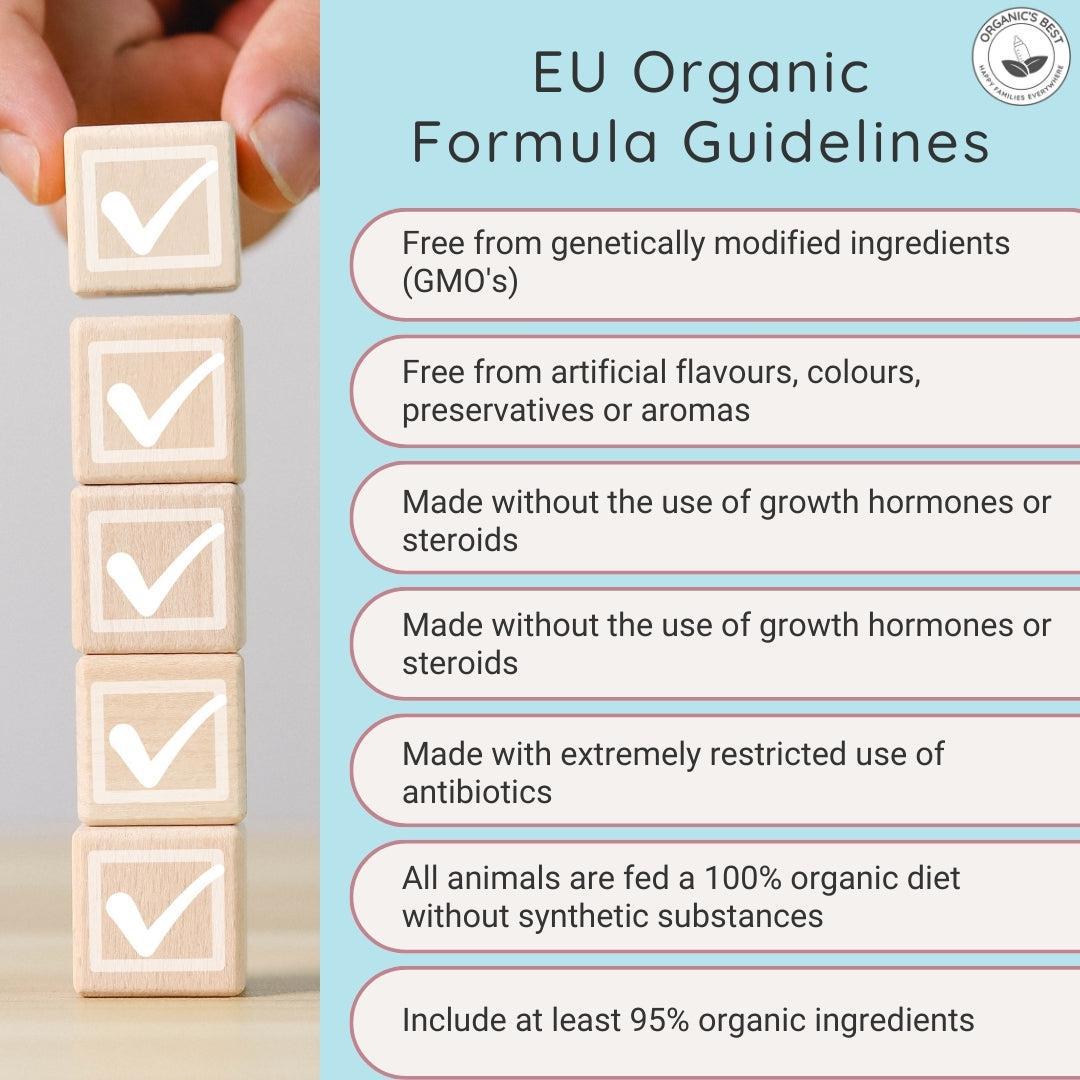
-
Free from genetically modified organisms (GMOs)
-
Free from artificial flavours, colours, preservatives or aromas
-
Made without the use of growth hormones or steroids
-
No chemical pesticide sprays used during farming
-
Made with extremely restricted use of antibiotics (only used when necessary for the health of the animal)
-
All animals are fed a 100% organic diet without synthetic substances
-
Include at least 95% organic ingredients
European Organic Baby Formula vs Organic American Formula
The United States has a body called the U.S. Department of Agriculture (USDA) that regulates the certification of organic baby formula, and in Europe, they are regulated by the European Union (EU).
The EU organic logo is an overarching government-regulated label that applies to various countries in the EU, but certain countries also have independent certifications, such as AB France. A product may also be certified by private European organizations, such as Demeter or Bioland.
The US has various organic classifications that don’t exist in Europe, each abiding by different standards.
US Organic Classifications Include:
-
100 % Organic: All ingredients and processing aids must be certified organic.
-
Organic: All ingredients must be certified organic unless specifically allowed per the National List, with a maximum of 5% non-organic ingredients.
-
Made With Organic: At least 70 % of the ingredients must be certified organic ingredients.
-
Specific Organic Ingredients: These products can be any combination of organic and non-organic ingredients.
While formulas in the US are completely safe and widely available, there are a few factors that make organic European formulas a desirable choice for parents:
EU Organic Regulations Stipulate:
-
Required organic ingredient content 🍃: For a product to hold the EU Organic logo, at least 95% of its agricultural ingredients must stem from organic production.
-
Minimum lactose levels 🥛: At least 30% of all carbs in European baby formula must come from lactose because lactose is the primary carb in breast milk.
-
No GMOs 🔬: GMOs are strictly prohibited, which we appreciate because the long-term consequences of GMO consumption are still being studied, and scientists have raised concerns about allergenicity, toxicity, nutritional changes and antibiotic resistance.
-
No added sugar ❌: European organic formulas do not contain added sugars or artificial sweeteners, so there are plenty of options for infant formula without corn syrup, an ingredient found in almost half of US infant formulas.
-
Staged nutrition 🔢: European formulas are divided into stages to fit the specific dietary needs of children at different stages of nutritional development. In the US, most formulas are made as a "one size fits all" product.
-
More widely available pro & prebiotics 🦠: Some European baby formulas contain prebiotics and probiotics to support the gastrointestinal health of babies, which is less common in US formulas.
-
DHA is mandatory 🧠: Docosahexaenoic acid (DHA) is required in European baby formula for optimal visual and cognitive development.
-
Greater selection of milk types 🐐: There is a more widely available selection of baby formulas in Europe, specifically goat milk formulas, whole milk formulas, and special formulas.
Private European Organic Certifications
European private organic certifications, such as Demeter, go beyond EU organic standards and are considered some of the strictest in all of Europe. Demeter, in particular, is biodynamic, which means that their agricultural practices are self-sufficient by generating their own soil fertility, as they use healthy and regenerative cultivation methods.
Additionally, the German organic baby food company HiPP has introduced their own organic label for their milk formulas. The HiPP organic seal goes beyond conventional organic standards and aims to achieve even lower levels of trace residues than what is required by law.
Is Organic Baby Formula Really Better?
So, is organic formula really better? We think so! Not only are organic products held to additional standards beyond conventional infant nutrition requirements, but they also sustain and promote biodiversity, ecological balance, and soil fertility. Plus, these standards are upheld and monitored through yearly testing and appointed control bodies who inspect each stage of operation.
Organic farming can also help reduce exposure to harmful chemicals, as many are prohibited for use in farming practices, and thus, eating an organic diet can potentially decrease pesticide exposure in children.
This is important because research into infant health suggests that specific stages in human development are sensitive periods where exposure to toxins can permanently change how our biological system functions, and as a result, children exposed to pesticides may be more susceptible to certain illnesses and diseases such as asthma, ADHD, autism and cancer.
Thankfully, pediatric researchers have reported that "an organic diet reduces children's exposure to pesticides, and when kids switched from a conventional to an organic diet, urinary pesticide metabolites dropped to almost undetectable levels".
Ranking The Best Organic Baby Formula From Germany
We're here to help you on your formula-finding journey! To do so, we have spent hours researching formulas, scrutinizing scientific studies, and analyzing ingredient lists so that we can give trustworthy and reliable recommendations based on the latest scientific findings in infant nutrition. We encourage you to check out our "How We Review Page" for more info on our standards for rating each product.

To make our ranking of organic formulas as comprehensive as possible, we have evaluated each baby formula based on five key criteria: European organic certification, non-GMO ingredients, lactose or milk as the primary ingredient, no added sugars or artificial sweeteners, and the inclusion of ARA & DHA.
We've also awarded bonus points for the inclusion of probiotics and prebiotics and the absence of maltodextrin, starch, and palm oil. Each performance category is assigned 1 point for a maximum of 10 points in total.
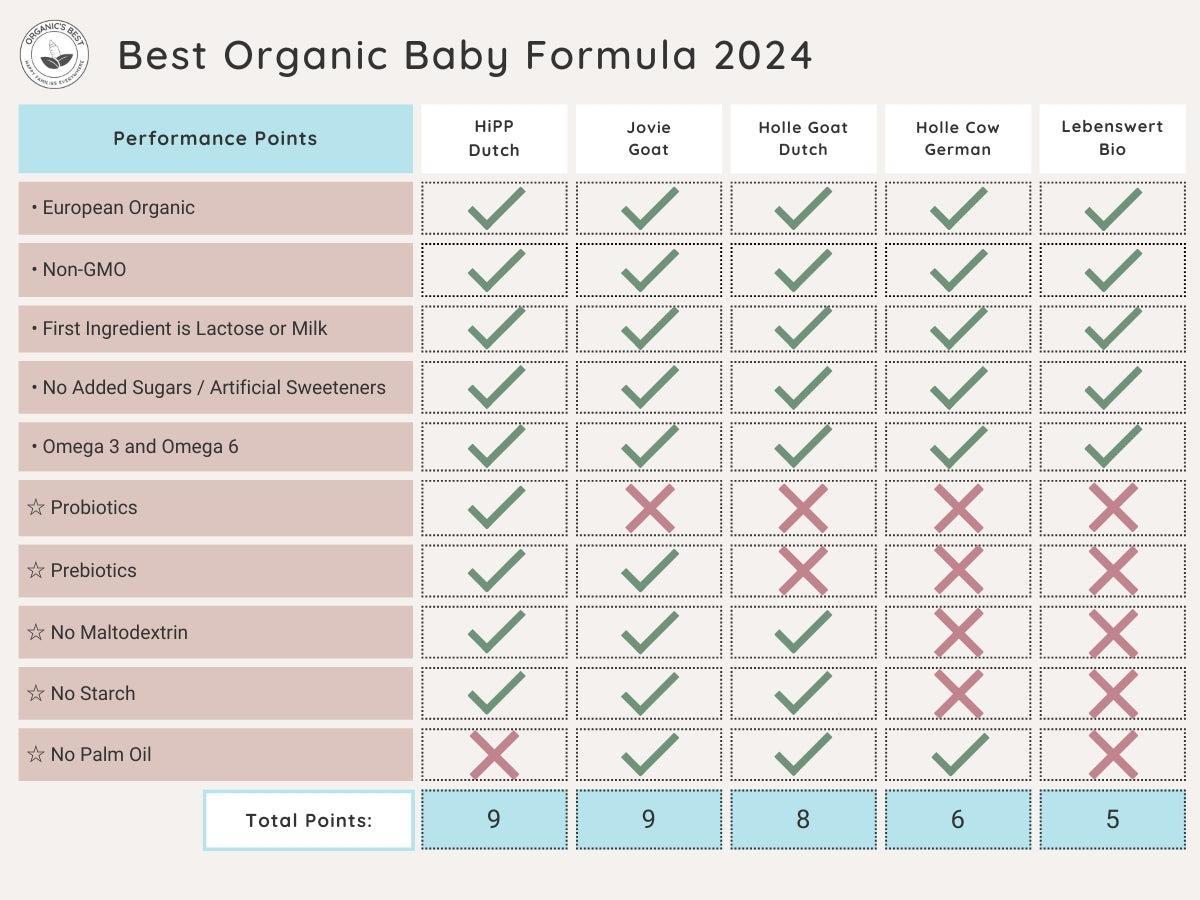
Best Organic Formula Closest to Breast Milk - HiPP Dutch
HiPP, a family-owned company, has been a part of the baby food industry since 1899. Today, their commitment to quality and sustainability continues to impress. Parents love HiPP Dutch for its 100% lactose-base, nourishing blend of organic ingredients and overall gentle formulation that many parents have described as helping to relieve common digestive conditions in infants like colic, constipation, bloating, and gas.
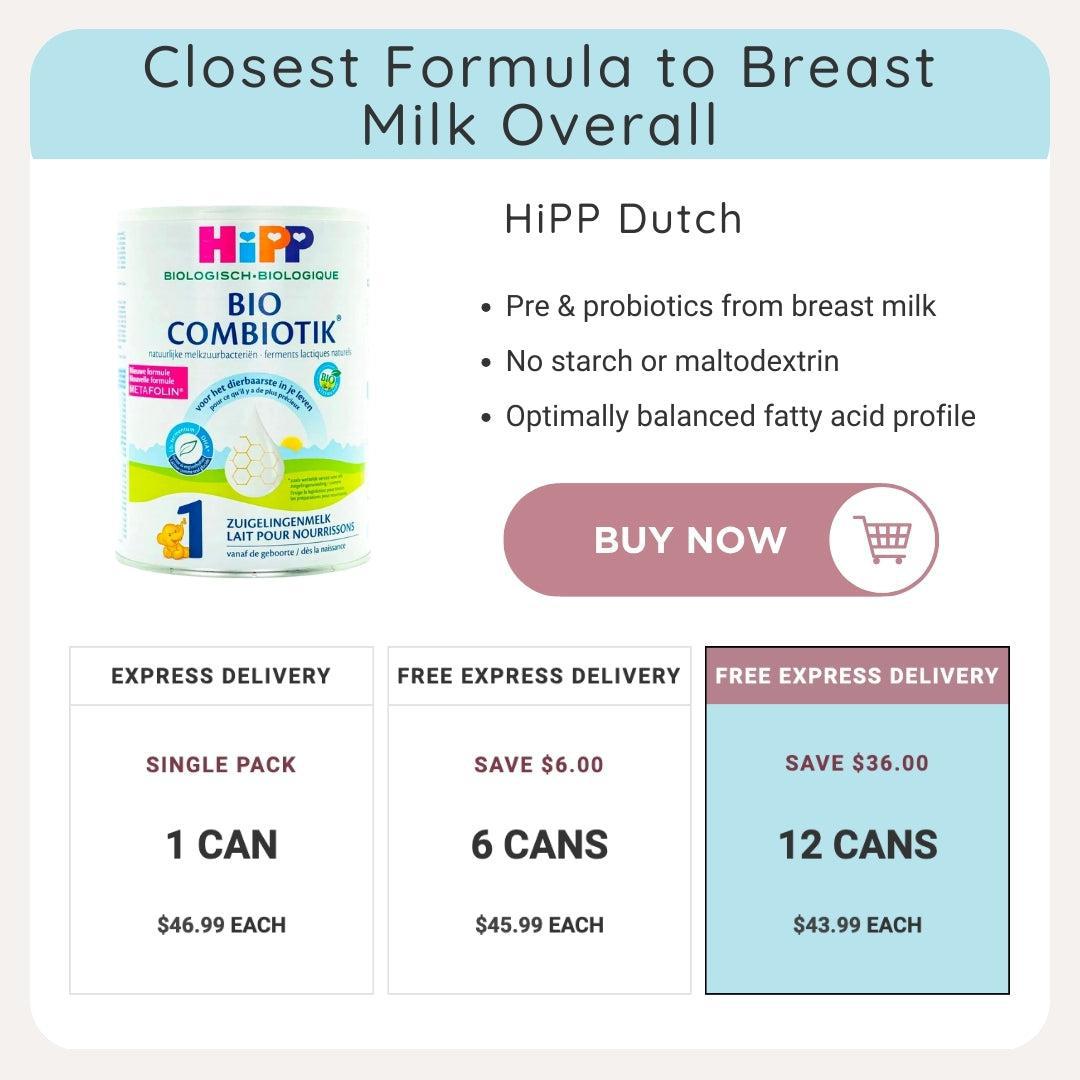
Pros ✔️
-
With pre & prebiotics originally sourced from breast milk
-
All stages are free from starch and maltodextrin
-
Optimally balanced fatty acid profile
Cons ❌
-
Contains sustainably sourced palm oil
Leading Qualities of HiPP Dutch
The first quality that we look for in a formula is whether or not it bears the coveted EU Organic logo. While checking out the HiPP Dutch can, we did spot this label, along with the HiPP Organic Seal. While these logos both signify the presence of organic ingredients, their standards do differ slightly.
EU organic certification is essentially the baseline for all organic products in Europe, where at least 95% of ingredients must meet organic standards. To meet these standards, product manufacturers must follow the guidelines outlined above, such as adhering to strict chemical-free agricultural practices and steering clear of GMOs.
While the EU logo covers most of the bases of organic production, after further research, it is clear that the HiPP organic seal takes it a step further. They have utilized 60 years of experience in organic farming to create a certification that looks at the quality of organic products after they have grown, with a focus on lowering pesticide residues. To do so, they carry out additional quality control checks at the highest technological level.
HiPP boasts that their measuring equipment is so sensitive that ''[it] can filter out about 1,200 possible residues, in such small amounts comparable to a grain of salt in a 25 m swimming pool.''. making it some of the cleanest baby formula available.
Following the organic label, we like to look at the base of the formula to see where a baby is getting the bulk of their nutrition. In this regard, HiPP Dutch is impressively 100% lactose-based across all stages. But, as always, quantity doesn't necessarily matter if the product doesn't meet quality standards. Thankfully, HiPP Dutch formula excels in both areas.
All of the milk used in HiPP organic baby formula is sourced from cows that live in optimal animal welfare conditions. They spend their days grazing on natural pastures, enjoying a controlled diet of grass, straw and grain. In accordance with EU organic standards, the cows are also kept far away from any mineral fertilizers or chemical-synthetic sprays!
We love to see a formula that is mindfully created from farm to table, and part of that is staying away from ingredients that aren't beneficial, like added sugars or artificial sweeteners. HiPP Dutch is not only free from these unnecessary additives, but it also includes an abundance of vitamins and minerals meant to support infants at all stages of development.
We were particularly impressed with the use of Metafolin® instead of folic acid in this formula, which is more easily absorbed by babies and is similar to the folate source found in breast milk. The final quality point is awarded for adding DHA and ARA in a 1 to 1 ratio because many experts in infant nutrition agree that this is the ideal ratio to support infant health and development.
Bonus Points Awarded to HiPP Dutch ☆
We know that HiPP formula stands out for its innovative approach to infant nutrition, so while looking over the ingredients in this organic baby formula, we were excited to find a unique ingredient that isn't commonly found in infant formula, which is natural probiotic lactic acid cultures.
The exciting part is that these cultures are originally extracted from real breast milk! Our findings show that, like other probiotics, this ingredient supports digestive health and immune health. Prebiotics are also added to this baby formula to create a balanced gut microbiome, which can help ease common stomach conditions like constipation, bloating, and gas.
Maltodextrin, an ingredient with some controversy, is commonly used as a thickener in many baby formulas. However, HiPP has opted to exclude this ingredient to enhance its beneficial effects on sensitive stomachs. Additionally, this formula is starch-free, making it extra gentle. Rather than incorporating additional carbohydrates, HiPP Dutch proudly offers a 100% lactose-based profile! This feature is consistent across all stages, meaning they offer some of the best toddler formula without unnecessary sugars.
HiPP Dutch does contain palm oil, which parents may not be a fan of. However, in alignment with the other ingredients in this baby formula, the palm oil is sustainably sourced and nutritionally beneficial. In this case, it is added to attain a fatty acid spectrum closer to that of breast milk.
What Parents Say 💬
|
Best Organic Formula Without Corn Syrup - Jovie
Jovie Stage 1 is lovingly made by parents and goat milk experts, offering babies the purest nutritionally complete alternative to breastfeeding. It boasts an impressive list of organic ingredients, which includes gentle whole goat's milk, essential fatty acids, prebiotics and a host of nourishing vitamins and minerals.
While Jovie is gentle on tiny tummies, goat's milk formula is not suitable for babies diagnosed with a cow's milk protein allergy (CMPA) or lactose intolerance.
Pros ✔️
-
Nutrient-packed full-fat goat milk
-
Gentle and easy-to-digest milk proteins
-
Enriched with naturally occurring prebiotics
Cons ❌
-
Does not contain probiotics
Leading Qualities of Jovie Goat Organic Baby Formulas
Starting off strong, Jovie organic whole goat milk formula meets the rigorous EU organic standards, which means we found the classic green and white starred leaf logo on this product. Jovie is also proudly non-GMO and even glyphosate residue-free!
Glyphosate is a widely used herbicide that may negatively affect nervous system development. Research suggests that "exposure to glyphosate during the early stages of life can severely affect normal cell development by deregulating some of the signaling pathways involved in this process.". For this reason, we were pleased to see that Jovie formulas have been certified glyphosate residue-free, which is also a selling point for parents on the hunt for the safest baby formula.
Jovie formula is made with a nourishing base of organic whole goat's milk and lactose, making it particularly easy to digest. We were especially thrilled by Jovie's whole milk fat profile, as it helps improve calcium and fat absorption and supports digestion and bone health. The lactose found in goat's milk not only provides babies with energy but also gives this formula a natural sweetness that babies adore; that also means no added sugars or artificial sweeteners!
To aid in immune system regulation, and brain and eye development, this formula includes essential fatty acids in the form of DHA (Omega-3) & AA (Omega-6). While DHA has been a mandatory ingredient in European baby formulas since 2022, research shows that "when infants receive both AA and DHA supplementation, they have better outcomes in cognitive performance than receiving DHA alone.".
Bonus Points Awarded to Jovie Goat ☆
Despite not containing probiotics, Jovie infant formula does include naturally occurring prebiotics from lactose. We pay close attention to this ingredient in infant formula because our review of infant nutrition literature suggests that adding prebiotics to formula can alter gastrointestinal microbiota to more closely resemble that of breastfed infants. Since breast milk is the gold standard for infant feeding, it makes sense that we would want formula to interact with the body similarly in the case of formula feeding.
Jovie is known and loved for its gentle formulation, which is supported by the omission of starch and maltodextrin in all stages. It is also free from palm oil, as this ingredient is not needed when a formula is made with whole milk. This is great news for parents, as palm oil may make it difficult for the body to absorb calcium and is known to worsen constipation in some infants.
What Parents Say 💬
|
Best Natural Baby Formula from Goat’s Milk - Holle Goat Dutch
Holle goat milk baby formula makes our list for being very well tolerated by many babies with mild feeding sensitivities to cow’s milk. This nourishing and gentle goat’s milk formula is specifically developed for the Dutch market but is loved by babies around the world! The simple organic ingredients make it one of the most natural baby formula options on our list!
While this formula is great for addressing mild tummy troubles, it's not suitable for more severe conditions like a cow's milk allergy or lactose intolerance.
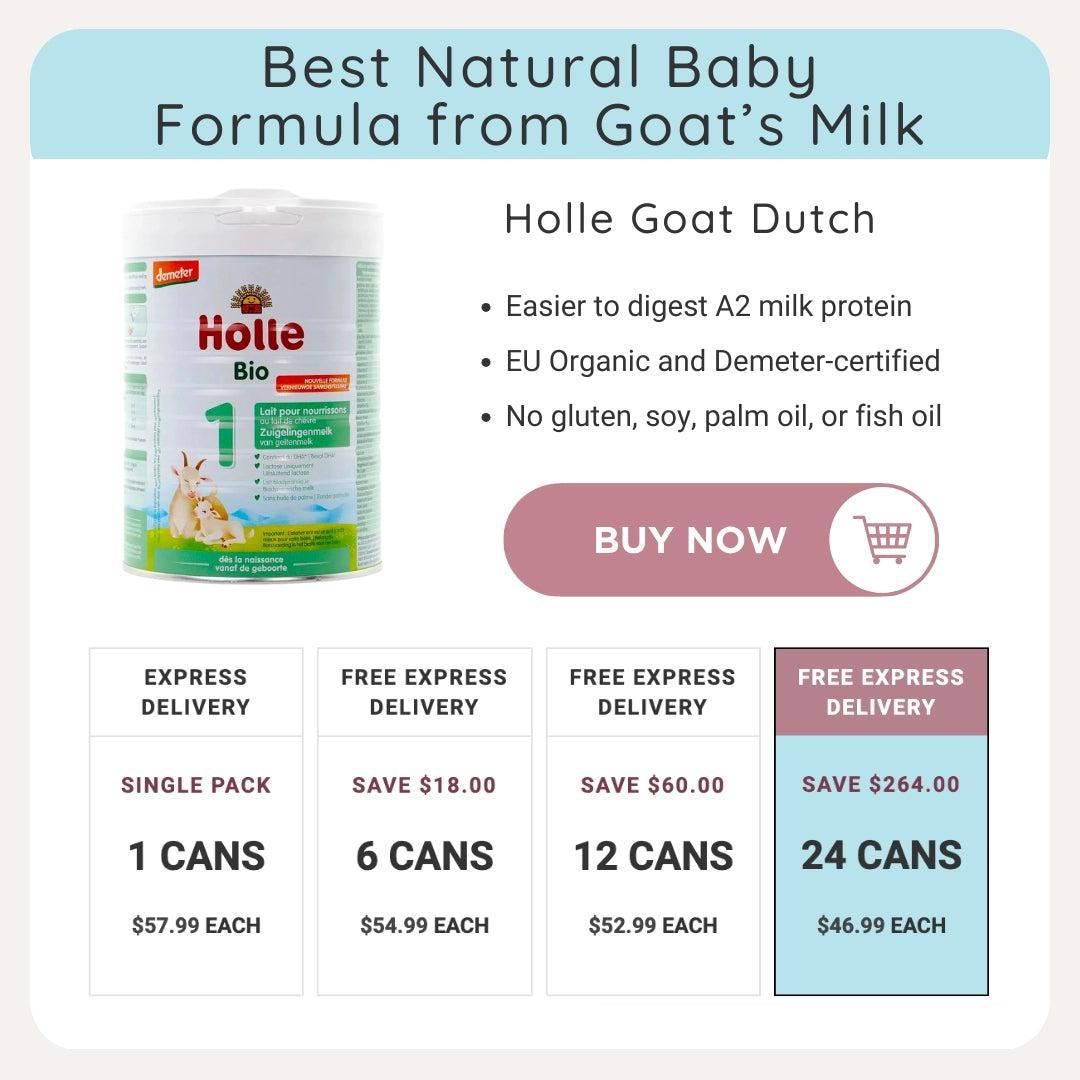
Pros ✔️
-
Easier to digest A2 milk protein
-
EU Organic and Demeter-certified
-
No gluten, soy, palm oil, or fish oil
Cons ❌
-
No prebiotics or probiotics
-
Stages 2 and 3 contain starch and maltodextrin
Leading Qualities of Holle Goat
Holle Goat organic formula for babies is one of the few products backed by the Demeter certification, which carries the highest organic standards in Europe. In accordance with these standards, Holle Goat formula does not contain genetically modified ingredients.
One attribute that stood out to us about this formula was the simple and gentle nutritional base of organic whole goat’s milk.
In a study by Alkaisy et al. in 2023, it was revealed that "goat milk proteins have several health benefits, including immunomodulatory effects, allergy management, anti‐inflammatory, and antioxidant effects, as well as antimicrobial and anticancer properties."
One of our favourite benefits of goat's milk is that it is easily digestible due to the protein structure, which helps form milk clumps in the stomach that are smaller, softer, and looser than those formed by cow's milk. The goat's milk in this formula also provides a natural sweetness and creaminess, so you won't find any added sugars or artificial sweeteners like corn syrup.
Learn more: Holle Cow vs Goat Formula Comparison
Finally, we were pleased to find that this formula also boasts an impressive fatty acid profile, which includes DHA and ALA.
Bonus Points Awarded to Holle Goat ☆
When it comes to figuring out what is the best baby formula, Holle believes that infant nutrition does not have to be complicated. To achieve this, they avoid adding any ingredients that are not deemed necessary, such as prebiotics and probiotics. While this makes it a great choice for parents looking for clean and simple nutrition, we have removed two points in these categories.
Initially, we were happy not to find any starch and maltodextrin in Stage 1. However, upon further analysis, we discovered that Stages 2 and 3 include both of these complimentary carbs to create a smooth, creamy texture that can help keep babies feeling full for longer.
Just like Jovie, Holle Goat is also free from palm oil, which is great if you're trying to avoid this ingredient for ecological or health reasons.
What Parents Say 💬My newborn was having serious digestive problems with the formula from the states and my sister in law had suggested Holle. And I specifically choose the goats milk formula Dutch version because of the clean ingredients and easiness on the stomach. As soon as we started on it my new born started sleeping better, no more fussiness, digestive issue, or spitting up. I like that if you buy in bulk, the lower prices go. |
Best Organic Formula for a Sensitive Stomach - Holle Cow German
Holle is a leading baby formula manufacturer, with over 50 years of experience in biodynamic infant nutrition. Their German cow's milk range is one of the best organic baby formulas on the market and is a go-to choice for many parents. It is uniquely produced at Demeter-certified organic, biodynamic farms, and is held to the strictest European organic standards.

Pros ✔️
-
Demeter quality milk
-
Short ingredient list
-
Chemical-free agriculture practices
Cons ❌
-
No prebiotics or probiotics
-
Contains organic palm oil
-
Stage 2 and up contain starch & maltodextrin
Leading Qualities of Holle Cow, The Best Formula for Sensitive Stomach
Just like Holle Goat milk organic baby formula, their cow's milk formula meets both European organic and Demeter biodynamic standards. These certifications prohibit the use of GMOs in organic infant formula.
Unlike some of the other brands discussed above, Holle cow is made with a classic base of skimmed cow's milk. This ingredient has been a component of baby formula ingredients for decades. Holle, in particular, sources their Demeter milk from southern Germany, where happy cows have access to fresh air throughout the year.
Holle formulas have some of the shortest ingredient lists with no unnecessary additives like added sugars or artificial sweeteners. However, we appreciate that this formula does contain fatty acids DHA and ARA.
Bonus Points Awarded to Holle Cow ☆
In alignment with Holle's simple formulation, they have omitted both probiotics and prebiotics. While they may concern some parents, especially if your baby has a sensitive tummy, rest assured that this formula is extra gentle thanks to the inherent benefits of goat milk.
In terms of complimentary carbs, we did find maltodextrin in this formula range with the exception of Stage PRE and 1. We also found organic starch in Stages 2, 3 and 4. This helps keep the formula thick and creamy while also naturally prolonging its shelf-life.
Throughout our evaluations of the best organic baby formula, we've noticed that organic formulas made with skim milk tend to have palm oil in them, and Holle Cow is no exception. While some parents may wish to avoid this ingredient, we were impressed that Holle sources their organic palm oil from certified sustainable production (RSPO segregated) in Colombia, Ecuador and West Africa, to address the ethical and health concerns linked to this ingredient.
What Parents Say 💬We have combination fed both of our kids from about 2 months of age and this formula has worked well for both of them. The taste and smell is very similar to breastmilk so they had no issues switching between formula and nursing. Being from the US we tried to find an option we could buy locally in stores but everything else we’ve tried has resulted in nasty spit up and bad diapers. I’m so relieved to have a reliable supplier that I can trust to deliver quickly. |
Best Value Organic Formula - Lebenswert Bio
In 2009, Holle launched their sister company, Lebenswert Bio, to provide parents with a more cost-effective formula compared to other leading brands. Their organic baby formulas are Bioland certified, which has some of the strictest organic European standards!
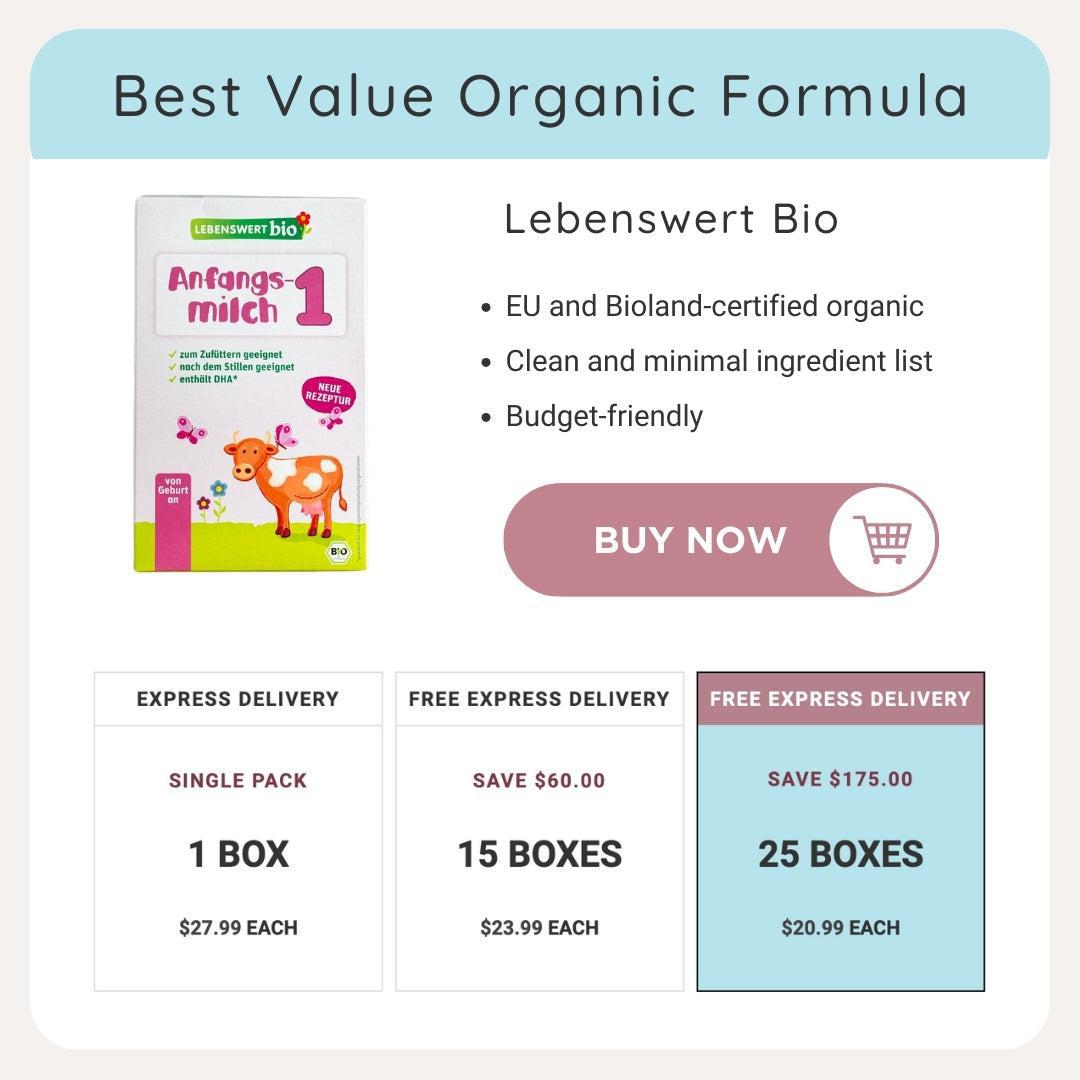
Pros ✔️
-
EU and Bioland-certified organic
-
Clean and minimal ingredient list
-
Budget-friendly
Cons ❌
-
Stages 2 and 3 contain complimentary carbs
-
Contains palm oil
Leading Qualities of Lebenswert Bio Organic Formulas
We were immediately impressed by the organic standing of Lebenswert Bio, which holds both the EU and Bioland certifications. In fact, it is the only German formula certified by Bioland! Being a Bioland partner means that Lebenswert Bio's products exceed the minimum organic requirements laid out by the EU.
For over 50 years, Bioland members have strived to find an alternative to the intensive conventional farming system, and instead, they utilize a model that works in balance with nature and prioritizes sustainability.
On top of that, Lebenswert Bio is made without GMOs and is free from added sugars and artificial sweeteners like corn syrup solids. This formula also has a gentle base of skimmed cow's milk, from Bioland-certified organic farms in Germany and Austria. Based on the standards mentioned above, it was no surprise to find that Lebenswert Bio includes DHA and AA for optimal nutrition.
Bonus Points Awarded to Lebenswert Bio ☆
Just like Holle, Lebenswert powdered formulas are kept as clean and simple as possible, so they also omit prebiotics and probiotics. To keep this formula gentle for newborns and similar to breast milk, Stage 1 boasts a simple organic lactose base. However, you will find complimentary carbs in both Stage 2 and Stage 3.
One final point was removed for the inclusion of palm oil. While this may not be an optimal choice for some parents, in this case, palm oil is added to attain a fatty acid profile similar to breast milk.
What Parents Say 💬Our pediatrician is so impressed with the quality and content of the formula and so are we. Our little is growing strong and healthy. Shipping was incredibly fast, even during these difficult times. We went with the Lebenswert Formula. |
European Formula Comparison Chart
All of our organic formulas are packed with lactose and Omega-3 (DHA) and are completely soy-free. While the core ingredients remain the same, there are some slight variations in other components across our range of organic baby formulas. To help you understand them better, here's a simple overview!
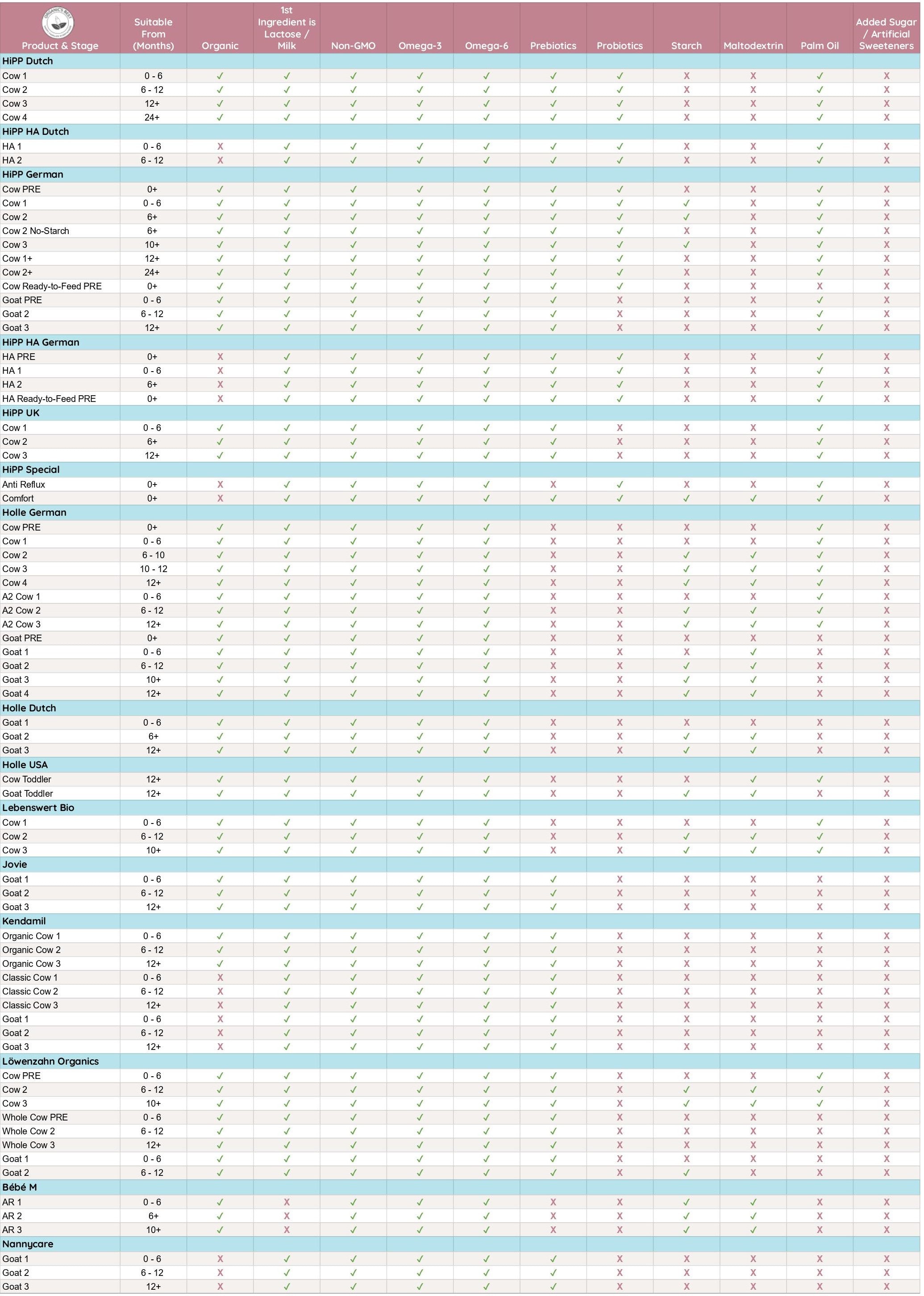
What is the safest and healthiest formula? Factors to consider when buying formula:
While scouring through information about the best organic baby formulas, it's important to keep a few things in mind. Here are 3 points to consider to help you find the right baby formula for your little one. family.
1. Select The Best Ingredients
It is important to be aware of what ingredients are in baby formula and what purpose they serve to help choose the best product for your little one. Here we list some green flag ingredients, which are indicators of a high-quality organic product and red flag ingredients that are best to avoid.
Ideal Baby Formula Ingredients 👍
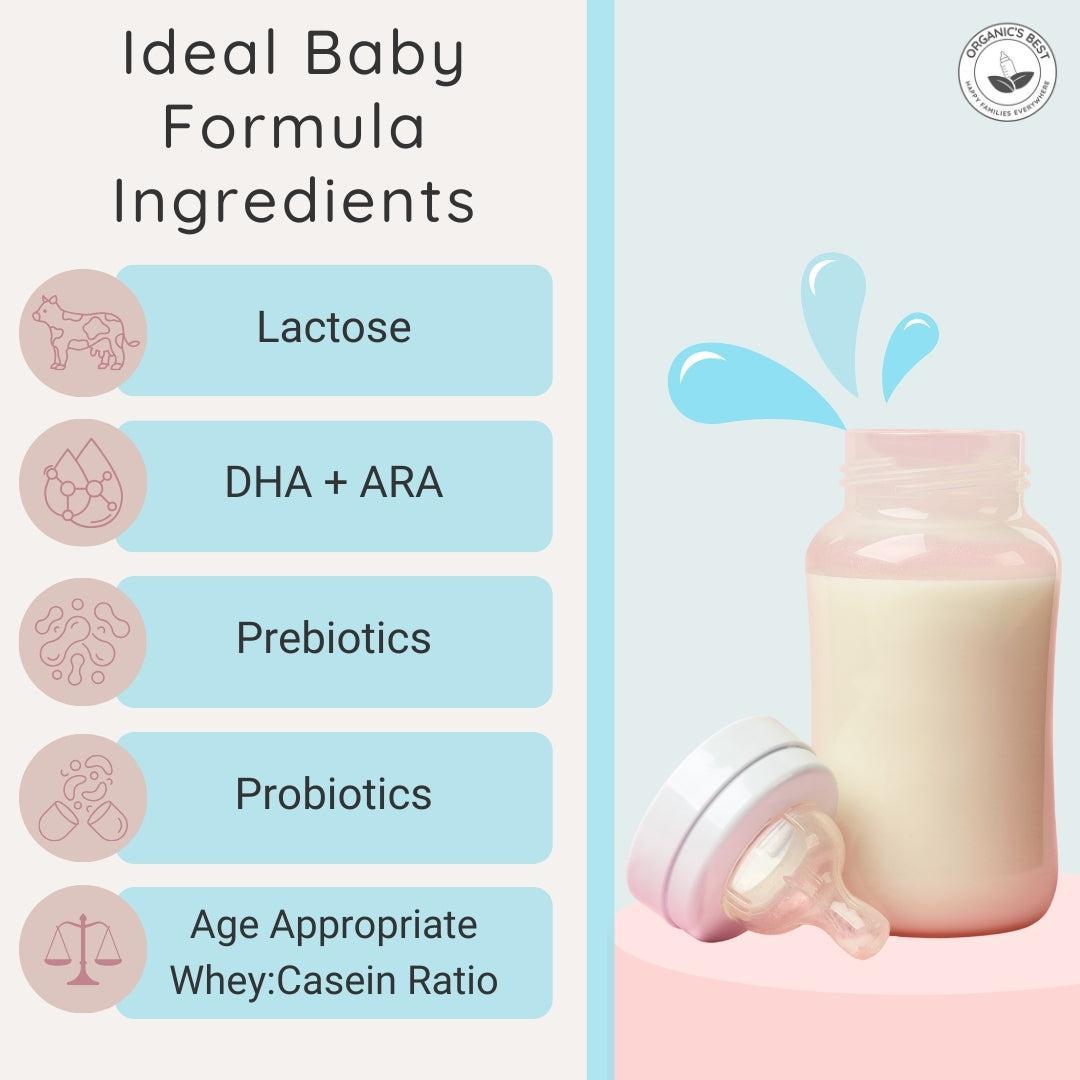
-
Lactose: Lactose is a natural milk sugar and the main carbohydrate in breast milk. It promotes faster absorption of iron and calcium, provides babies with energy for growth and development, and supports the development of healthy gut microflora.
-
DHA and ARA: These polyunsaturated fatty acids must be provided by foods because they cannot be synthesized by our bodies. Omega-3 (DHA) and Omega-6 (ARA) play an essential role in the development of the brain and eyes. Unlike US formulas, European formulas are required by law to have DHA, although ARA remains an optional ingredient for both.
-
Prebiotics: Prebiotics are fibers that feed energy to healthy gut bacteria. They help help improve metabolic health and regulate the immune system. Because of this, they can help improve common tummy troubles like constipation and soothe your baby's digestive system
-
Probiotics: At birth, babies have a sterile gastrointestinal system because exposure to bacteria before birth can be dangerous. So, for those nine months, babies live and grow in a sterile, safe zone that is microbe-free.
However, after birth, microbes like probiotics begin to be introduced into babies’ bodies which helps to strengthen their immune systems and prevent infections. Infant probiotics aid immunity, boost infection resistance and nutrient absorption, and promote detoxification and metabolism!
-
Age-Appropriate Whey to Casein Ratio: Casein and whey protein are the main proteins in milk. In fact, they are building blocks for your child's body and act as catalysts for various bodily processes.
Baby formulas from birth to 6 months of age contain mainly whey proteins, while baby food for children over 6 months of age often contains more casein. Adjustments in the whey-to-casein ratio are made to reflect the natural changes that occur in human milk.
Ingredients to Avoid in Baby Formula 👎
-
Added sugar and corn syrup solids: Too much sugar can be very dangerous for small children and babies as it has been linked to an increased risk of diabetes, obesity, and tooth decay.
-
Carrageenan: Carrageenan is derived from a type of red seaweed and is used to thicken, stabilize and alter the consistency of foods despite it being a suspected carcinogen. It has also been known to irritate the intestines and may be linked to some forms of irritable bowel syndrome and other health issues.
-
Soy: Soy protein contains isoflavones, a compound chemically similar to estrogen, which can disrupt hormone development. It also contains higher levels of phytates, which make it harder for the body to absorb certain minerals such as zinc, calcium, and iron.
The consumption of access soy may be linked to insulin resistance, a condition that could potentially lead to the development of Type 2 diabetes. For these reasons, soy-based formulas should only be used if medically necessary and recommended by a pediatrician.
Check out the best dairy and soy free formula!
2. Chose the Appropriate Age / Stage
Since European baby formulas come in a variety of stages, it is important to choose the one that matches your child's age.
3. Select a Formula Within Your Budget
Feeding your little one shouldn't break the bank, so make sure to consider your budget when choosing between European formulas. Fortunately, our products come in a variety of price ranges to accommodate different financial situations.
As a special incentive, all first-time customers qualify for two free boxes or cans of formula when purchasing 12 or more formula containers from us. Plus, we offer bulk order discounts starting from orders of 6 formulas for all our customers. This means you can save more money with every additional box or can of formula you purchase! 🍼
Our Favourite Clean Baby Formula Brands
While we are consistently impressed by numerous European formula manufacturers, HiPP and Holle stand out for their wide range of infant formulas and exceptional quality. Here's what's earned them our praise:
HiPP Formula
From first selling baby food in 1899, HiPP has been family-run for generations. With more than 50 years of experience crafting organic infant formulas, HiPP has become the leading brand in Europe's organic baby nutrition industry!
-
HiPP formulas take full advantage of the wholesome qualities of nature to bring your baby an organic formula modelled after breast milk.
-
Each formula contains gentle ingredients based on years of research and is produced in the world's first carbon-neutral formula facility.
-
They have an extensive selection of formulas based on cow or goat's milk made in multiple country versions, in addition to providing special formulas.
Holle Formula
Holle, the first Demeter-certified company, is family-owned and located in the border region of Germany and Switzerland. They were pioneers in biodynamic farming and quickly became one of the leading organic baby food brands in Germany, with over 85 years of experience.
-
All of their formulas are climate-neutral or positive, and they reject the use of chemical processing and artificial preservatives.
-
They offer a variety of cow and goat's milk-based formulas; some of which are Demeter-certified organic.
Different Types of Formula
Europe has many different milk options for their infant formulas, which may not be widely available elsewhere in the world. This can be confusing to navigate, especially if you're only used to seeing cow's milk formula. European formulas also come in a variety of forms, including powdered infant formula, liquid concentrated infant formula and Ready-to-Feed infant formula.
Here is a quick rundown of the different types of formulas offered by European retailers:
Cow's Milk Formula 🐄
Cow's milk formula is the most widely used alternative to breast milk, as it is well-tolerated by most healthy babies. It is formulated to mimic the nutritional composition of breast milk, providing all the essential nutrients little ones need.
Goat's Milk Formula 🐐
Goat's milk baby formula is a great choice for infants who may have difficulty digesting cow's milk. Many parents choose goat's milk formula for its naturally gentle qualities, which support digestive health and may ease tummy troubles.
Special Infant Formula 👩⚕️
Specialized formulas, such as an organic hypoallergenic formula, are designed to meet the specific needs of little ones with certain medical conditions or dietary restrictions. Depending on the ingredients used, special formulas may be organic or non-organic formulas. Before we discuss the different kinds available, it is important to note that you should consult your pediatrician before using a special formula.
1) Hypoallergenic Formula: Hypoallergenic formulas are oftentimes made with extensively hydrolyzed protein which involves breaking milk proteins into smaller pieces which are absorbed by the body more easily. Due to this process, the proteins are not as recognizable to the body, becoming less allergenic.
Extensively hydrolyzed formula (intended for milk protein allergy) are broken down by over 90%. Although many babies with cow's milk protein allergy thrive on this type of formula, it is not suitable for every baby with CMPA.
2) Comfort Formula: Comfort formulas are made to help with digestive discomforts that are common during the first days and months of a baby's life. Common symptoms of digestive discomfort caused by a developing gastrointestinal tract include bloating, colic, and constipation. This type of gentle formula is often made with a reduced lactose content, hydrolyzed milk proteins, probiotics and prebiotics.
3) Anti-Reflux Special Formula: Anti-reflux formulas reduce regurgitation for babies who belch or spit up more frequently. The consistency of this product is very thick, thanks to the addition of a thickening agent, which is usually carob gum. The formula also thickens in the baby's stomach due to fiber swelling in the acidic environment. Plus, carob gum can also help to relieve constipation!
4) Rice Special Formula: Rice protein hydrolysate formulas are made naturally through a mild enzyme process that breaks the rice proteins into smaller, more digestible components. They may also include thickeners to reduce regurgitation and regulate bowel movements. Rice formulas can also be a viable plant-based alternative to soy formula.
European Organic Baby Formula Stages
As your baby grows, so do their nutritional needs. Just as the composition of breast milk changes with a growing baby, so does the composition of staged formula. This ensures that the ingredients are adjusted to provide age-appropriate nutrients for your little one. As per European regulation, formulas are divided into infant milk, follow-on milk, and growing-up milk.
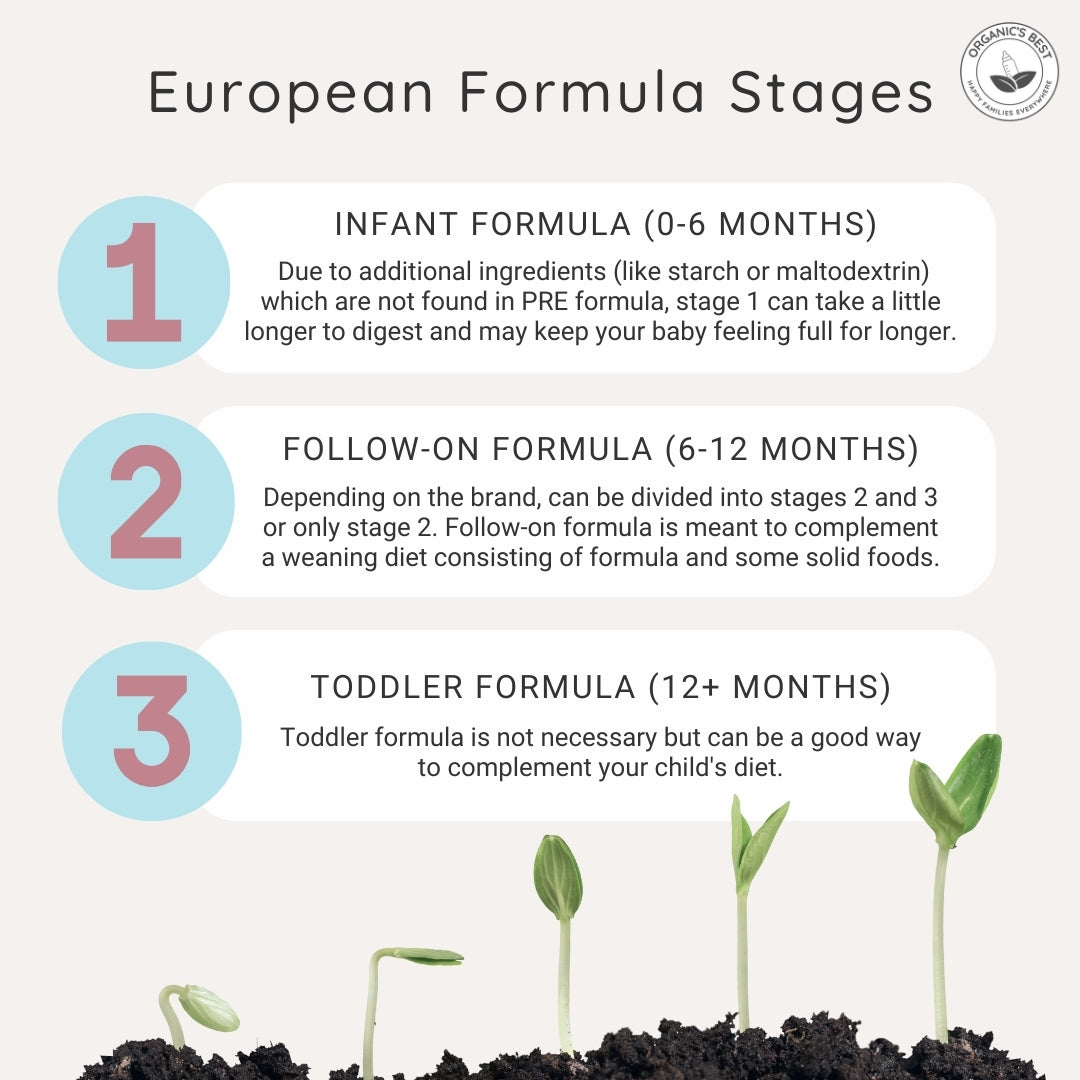
Stages PRE and 1 - Infant Formula (0-6 months)
Organic infant formula labelled "PRE" is often the stage closest in composition to breast milk. It has lactose as the only carbohydrate (like breast milk) and does not contain any starch or maltodextrin, which makes it easily digestible. Not all baby formula brands offer a PRE formula.
Like PRE formulas, stage 1 is suitable from birth. Depending on the brand, Stage 1 may include additional ingredients like starch or maltodextrin, which are not found in Stage PRE formula. For this reason, some Stage 1 formulas can take a little longer to digest and may keep your baby feeling full for longer.
Both PRE and stage 1 infant formulas provide proper nutrition for babies, in the end, the healthiest baby formula is what fits your baby's unique needs best!
Stages 2 and 3 - Follow-on Formula (6-12 months)
The term follow-on formula describes formulas for babies ages 6-12 months. Depending on the brand, it can be divided into Stages 2 and 3 or only Stage 2. Follow-on formula is meant to complement a weaning diet consisting of formula and some solid foods and should not be fed to babies under 6 months of age.
Stage 3 and Up - Toddler Formula (12+ months)
At one year, your toddler is likely participating in family dinners and eating balanced meals. For this reason, toddler formula is not necessary but can sometimes be a good way to complement your child's diet. Speak to your pediatrician to see if it's right for your little one.
Conclusion: Which organic baby formula is the best?
While all of the products mentioned above are some of the best organic formulas on the market, HiPP Dutch stands out as the best organic baby formula for its breast milk-like formulation and gentle qualities. Choosing an organic infant formula sets your child up for nutritional success, as they contain the vital ingredients needed for optimal growth and development.
When looking through the best European formula options, keep your eyes peeled for ingredients like lactose, prebiotics, probiotics, and fatty acids. Please remember to consult your pediatrician prior to making that final decision!
Scientific References
-
ALKaisy, Q. H., Al-Saadi, J. M. S., Al-Rikabi, A. K., Altemimi, A. B., Hesarinejad, M. A., & Abedelmaksoud, T. G. (2023). Exploring the health benefits and functional properties of goat milk proteins. Food Science and Nutrition, 11(10), 5641–5656.
-
Costas-Ferreira, C., Durán, R., & Faro, L. (2022). Toxic effects of glyphosate on the nervous system: a systematic review. International Journal of Molecular Sciences, 23(9), 4605.
-
Salem, N., & Van Dael, P. (2020). Arachidonic acid in human milk. Nutrients, 12(3), 626.
-
Thomson, A. W., & Fowler, E. (1981). Carrageenan: a review of its effects on the immune system. Agents and Actions, 11(3), 265–273.
-
Vania, A., Alleva, R., & Bernasconi, S. (2015). Is organic diet really necessary for children? Italian Journal of Pediatrics, 41(S2).
Disclaimer:
Please be aware that this information is based on general trends in babies, and it is not medical advice. Your doctor should be your first source of information and advice when considering any changes to your child’s formula and when choosing your child’s formula. Always consult your pediatrician before making any decisions about your child’s diet or if you notice any changes in your child. Breastfeeding is the best nutrition for your baby because breast milk provides your child with all the essential nutrients they need for growth and development. Please consult your pediatrician if your child requires supplemental feeding. |
Agustina Fernandez
Dr. Agustina Fernandez earned her medical degree from the prestigious Universidad Nacional de Córdoba, Argentina. With a deep-rooted passion for pediatrics, Dr. Fernandez is currently on the path to specializing in children's healthcare. Recently, she has delved into the vital field of infant nutrition. Her research interests include breastfeeding, infant formula, and baby food in little ones’ formative years. Dr. Fernandez's commitment to this area of study underscores her dedication to ensuring the health and well-being of children from their earliest days.
Leave a comment
Comments will be approved before showing up.
Also in Organic Infant Nutrition and Health Blog

Best Formula for Breastfed Babies 2024 Guide
by Agustina Fernandez March 19, 2024 15 min read
Read More
Baby Snacks: Best Healthy and Nutritious Options
by Agustina Fernandez March 04, 2024 14 min read
Read More